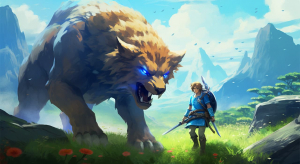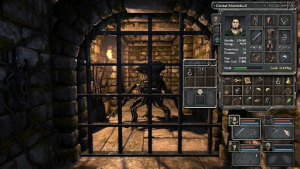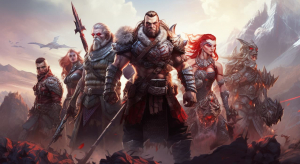If you closely observe the gaming trends these days, you will occasionally come across RPG games. These games have unique features that not only make them different but also make them more immersive and exciting to play. RPGs earned $20.2 billion in revenue in 2022. Genshin Impact and Honour of Kings generated the maximum revenue at $1.3 billion and $1.7 billion, respectively.
The unique RPG characteristics are the primary attractions of such games. From ample scope for character customization and development to immersive storytelling- the games can captivate the players thoroughly. Let us find out the characteristics that set apart these games from others.
The characters in RPG games perform specific roles in a fictional setting. It is generally a character-oriented multiplayer game. The players must enable the chosen role through the narrative or by acting it out. There are specific rules and guidelines for these games. The players have to obey the instructions as per their chosen role. How the game progresses is entirely dependent on the players’ choice. Thus, you consistently get new surprises, challenges, and mysteries to solve in an RPG.
There are six types of categories into which RPG games can get classified which are listed as follows:
The RPG features are occasionally witnessed in other game genres too. But what sets apart an RPG is the presence of all the features together to create the narrative. Here are the unique features every game development company will incorporate while creating an RPG:

The storyline and setting are the most intricate among the RPG features. It is the backbone of the game world and plays a pivotal role in making it immersive. The narrative is deep and engrosses the players. It initially starts with introducing the character but as the story progresses, the game branches out based on the character’s development that gets depicted through their choices.
The storyline has many plot twists that also result in more challenges. There are sub-games within the main quest and various surprises and mysteries hidden around the open world. These keep the players glued to the game. The storyline plays the main part in RPG game development . The game mechanics, rules, gameplay, and characters get developed revolving around it.
Take the example of The Elder Scrolls which has a complex game world to explore while you embark on various quests. Similarly, Genshin Impact follows the traveler and their choices as the narrative unfolds based on that.
Game development company need to create a storyline such that all the possible actions, outcomes, and decisions get considered in the gameplay. This will help avoid any confusion or contradictions in the gameplay and make the game more immersive.
Another distinctive role-playing game feature is the scope of traveling and exploring the game world freely. There will be many challenges and quests to follow in the main storyline. But you can choose to deviate from the path and look around. In role-playing games, you can easily interact with NCPs and even engage in mini-challenges by helping them. These secondary challenges and quests can improve your skills and abilities but are generally optional.
There are usually puzzles, surprise terrains, rewards, and unlocking new characters as a part of the exploration. In Genshin Impact, you can explore the terrain of Teyvat and collect various food items and herbs. Occasionally you will encounter monsters too. The food will help restore health while the fights improve the player’s skills.
Such side quests get created to make the game more engaging. It also adds a surprise element to the game and gives scope for players to gain more XP or treasures during “loots”. Happy Dungeon is an apt example of an RPG game where loots are meaningful. You can get several in-game rewards, weapons, and items that improve the player’s character. They can also get traded to gain in-game cash.

The inventory and items are prominent role-playing game characteristics that set them apart. The game gets more interesting as players can use these inventories to improve their character, level up their health, fighting skill, and overall powers. Moreover, occasionally the inventories play a crucial role in the primary storyline and quest.
Ranging from interactions with NCPs to random collectibles during the gameplay- there are a lot of items that accumulate. The inventory section helps the players to keep track of all these so that they can use them strategically later.
Sometimes, interaction with NCPs can also yield useful inventories. You can cook the food items collected in Genshin Impact through mini-games by interacting with an NCP possessing a stove or campfire. The cooked food gets stored in your inventory for later use. These dishes provide higher health bonuses compared to raw items or regular food. The inventory can also include items like armor, weapons, clothing, and special items like amulets, potions, keys, etc.
Many RPG games add mechanics to limit the total items to be carried in the inventory. This makes the game more interesting and challenging. The players have to judiciously use up the inventory to keep space for new things while exploring.
Unlike traditional games where the player is rather static, RPGs allow significant personalization of the player based on appearance, abilities, and skill. As the levels progress, new outfits, armor, and weapons get unlocked that can be used to modify your player. Some games also let players choose the character they wish to be in the game world. They can even switch characters mid-game as per the necessity of the quest as we witness Genshin Impact.
The scope to customize the character makes the games more immersive for players and they have developed a personal attachment to their avatars in the game.
Character customization also affects the course of the gameplay and the player’s skill. There are several types of modifications possible, depending on the game. Race, type, and sex are a few fundamental features that can be modified. Furthermore, some games also let you choose between humans, monsters, mages, elves, soldiers, etc. to play. The choice of character will affect the basic health status, intelligence, and skills of the player.
Another prominent RPG feature is an interactive game world. Players can easily interact with different elements within the game world and also explore the game. Unlike traditional games where you cannot go beyond a certain limit, the RPG game terrain keep expanding as you travel. You will meet NCPs who can provide insights for your quest and even with the inventory. There is a lot to do alongside the primary quest. As a result, the players stay hooked. Even if they are not pursuing the main quest, they still have a lot to do in the game world because of the interactive nature,

Game development companies keep updating new content, challenges, quests, and plot twists that keep such games interesting. They can have 50-60 levels and keep growing further, depending on the demand and popularity of the game.
The graphics also get updated with time too, partly to keep it engaging and to stay ahead in the competition with other similar games coming up. RPG games are a particular genre where developers update the content based on feedback from the fans. Especially if the game is very popular, the player’s expectations and opinions are taken into account to cater to their preference.
Role-playing game features are unique but not always limited to true RPGs. These days, there are often games that have few RPG features, but fundamentally are a different genre. Call of Duty: WWII features few RPG features but is essentially a first-person shooter game.
Whether you provide mobile game development services or an all-around game development studio, keeping in mind all the fundamental role-playing game features will help to develop a quality game.
If you are planning to develop a role-playing game, Juego Studios is one of the best choices. From full-cycle game development to game animation , they can provide you with a wide variety of services and make your gaming dream project a reality.